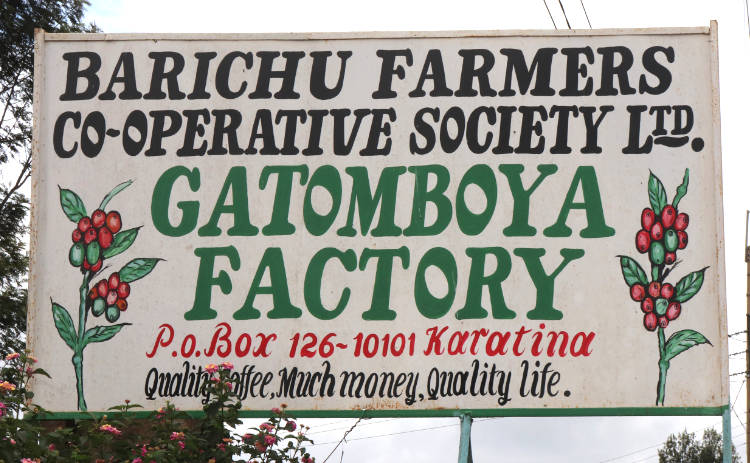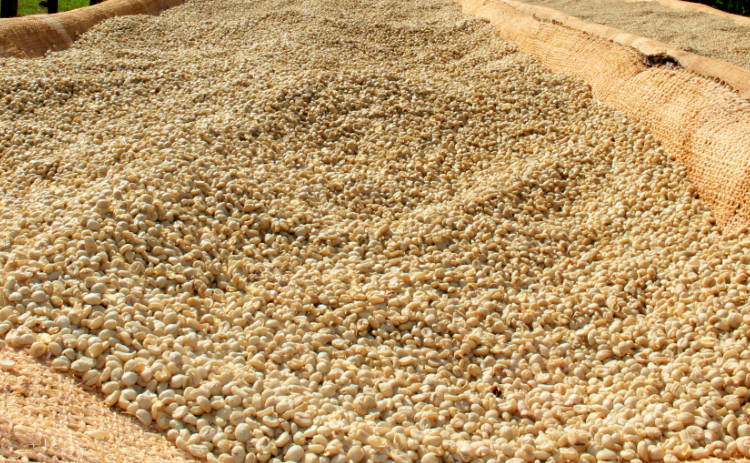About Kenya AA Barichu
Arrived late October 2023, in grainpro lined bags.
Nyeri Country produces some of the most sought after coffee in Kenya. This coffee is named not for the factory or wetmill where it was processed but for the Cooperative of coffee farmers that produced it. The Barichu cooperative is located near Karatina town is at the southern part of famous Mt. Kenya. The Barichu Cooperative Society has 1,450 small-scale farmers who also grow subsistence crops like banana and maize. Coffee cherry is fully washed with fresh river water from the Ragati River and sundried on raised beds. Processing was carried out at the Gatomboya factory.
Kenya has a unique double soak washing process and many factories or wetmills use the same methods. Washed coffee is distinguished by the clarity of the flavors and attributes that it can achieve.
During this process, the sugars present in the mucilage are removed through natural
fermentation or mechanical scrubbing.
Fermentation can be done by stacking the coffee outside or placing them under water and
allowing nature to take its course. After the sugars are removed, the beans then can be taken
through a secondary washing to remove any additional debris, or taken immediately to the
patios or beds for drying.
During wet processing, the pulp is removed mechanically. The remaining mesocarp, called
mucilage, sticks to the parchment and is also removed before drying.
Mucilage is insoluble in water and clings to parchment too strongly to be removed by simple
washing. Mucilage can be removed by fermentation followed by washing or by strong friction in
machines called mucilage removers. The method and supervision of fermentation can make or break a coffee's final outcome. These coffee cherries were hand sorted by the farmers before they went into production. After their skins were removed the coffee was put into fermentation tanks where it was stored at least overnight, then washed, soaked and spread on drying tables.
Time on the drying tables depends on climate, ambient temperature and total production volume undergoing processing. Drying can take from 7 to 15 days in total. Continuous sorting and hand turning of the parchment takes place throughout the drying process until the coffee reaches the desired moisture level of 11-12%. Lastly the coffee, in its parchment parchment gets stored to rest until delivery to the dry mill.

Sign at the factory gate where the Barichu coffee is processed

Barichu coffee in its parchment husks being sun dried on raised tables
This lot is comprised almost entirely of famed SL-28 and SL-34 varietals, Bourbon derivatives, that were developed decades ago by Scott Labs during the 1930s for the best flavors and are now being reproduced in areas around the world when conditions are right. These varieties are known for their depth, sophisticated flavor and wine-like acidity. These SL varieties have the potential to be exceptional when produced in the right place and with care. Kenya has become world famous for these varieties and the complexity of the resulting coffee. Top quality Kenya is on every coffee professional's list of favorites.
- Washing Station/Factory: Gatomboya
- Coffee Cooperative: Barichu Farmers Co-operative Society Ltd
- District: Nyeri County
- Division: Katarina Town
- Altitude: 1650 Meters above sea level
- Coffee Variety: Almost entirely SL28, SL34
- Shade Trees: Gravellea, Macadamia
- Soil: Red volcanic
- Processing: Washed
Cup Characteristics: Super clean, sweet coffee with notes of cinnamon, sugar cane and vanilla. Very dry, crisp and long finish. A well rounded Kenya selection that is distinctly classy in the cup.
Roasting Notes: Beans are hard and dense and can be roasted to a variety of darkness levels. Most floral and delicate notes will be presented at City+ to FC range. The delicate nuances of this coffee will present themselves at lightly roasted levels but be sure to have a full first crack. Some may prefer to finish the roast at the first sound of second crack. Behmor users try P1 or P3, or, switch to manual and increase drum speed in the latter part of the roast.

